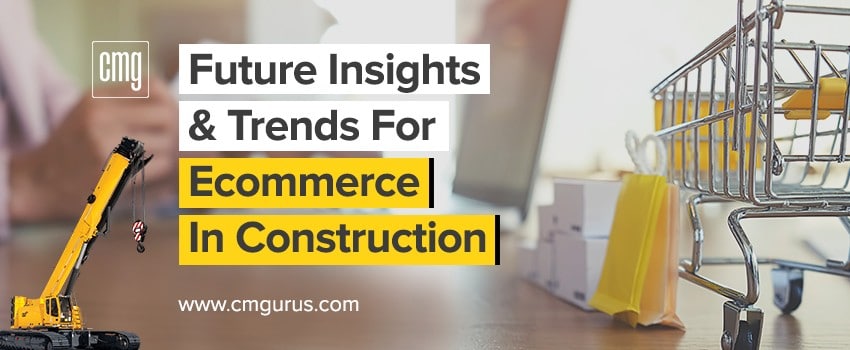The Future of Ecommerce is Bright for Construction Businesses
Technology has been slowly but radically changing how the construction industry works. Currently, ecommerce in the industry is in its beginning stages. This is a good thing through, because the construction industry, in general, lags behind many other sectors in terms of digital transformation. So businesses should realize the important ecommerce trends and insights in 2020 for construction companies and make the most of it.
Global Industry Analytics estimates that the construction market will be worth $1 trillion in 2030. And according to a report by Statista, by the year 2021, global ecommerce sales will touch $4.9 trillion. To take advantage of these ecommerce growth trends, construction businesses with a physical location will have to go online, or slowly become obsolete.
What is Ecommerce?
Ecommerce, electronic commerce, or internet commerce is the buying and selling of goods and services, and the transfer of money for these transactions using the internet or online services. Right now, ecommerce trends for the construction industry look very positive.
Benefits of Ecommerce
Starting an ecommerce business is a cost-effective business model. While managers can concentrate on managing, products are handled directly by e-distributors. But that’s not all. Read on to know more about ecommerce solutions and what the benefits of ecommerce are.
Deliver materials and equipment faster
E-commerce gives project managers the ability to offload or shop for materials and equipment in minutes. Orders can be placed quickly, shipped, and tracked in real time. While many construction businesses have online stores, they do not really attract sales outside of their usual buyers. On the other hand, ecommerce’s reach is much higher.
Bypass geographical constraints
Selling online makes it easy to sell to customers regardless of where they live. Buying and selling can also be done any time of the day and anywhere in the world. Ecommerce sites are, hence, great ways to reach a wider audience, more so than a physical store ever could.
Reduce costs
Setting up an ecommerce website requires a low investment and has a lower operation cost when compared to a physical store. The former requires minimal investment to start and to maintain, whereas the latter includes more monthly costs such as rent, utilities, and salaries. When you look at the time and money required to invest in websites, setting up on an ecommerce platform costs much less.
Easily re-target customers
Retargeting customers in your area is easy when you run an online business. You can capture email addresses and phone numbers in a number of ways. In brick and mortar stores, customers hesitate to share their personal information. But with the help of pop-ups, slide-ins, sidebars, header sign up bars, and footers it is easy to collect peoples’ information online. You can collect this data in exchange for a free downloadable brochure or newsletter.
Share more product details
Most customers seek out as many details as possible about something before they buy it. A product description is always helpful for materials and equipment listed in an ecommerce store. You can list out details about different variants of the products you have and make it easier for people to find what they need. These allow customers to make informed decisions about products or services and lets them compare features, functions, and specs.
Process more orders at once
With ecommerce shops, buyers won’t have to deal with wait times; they can just place their order online. As a seller, you also don’t have to physically have a product, which means that stock control won’t be something that you will have to worry about. This means that you can have a wider product range listed in your online store.
Ecommerce Trends and Insights in 2020 for Construction Companies
Many ecommerce trends are in the beginning stages and are already transforming the online retail world. These trends will provide even more opportunities for construction businesses to reach their customers better and increase sales. Some of the latest trends are listed below.
Voice-controlled searches
Voice technology has slowly been picking up in popularity for the past few years. With Siri and Alexa, you can easily command purchases. Voice search inquiries will return search results for websites with a voice control function. So even ecommerce website design will have to equip sites with a voice search feature. This is also called “voice commerce,” where voice commands replace the keyboard and mouse with the help of a virtual assistant.
Omni-channel unity
The word omni– has its roots in Latin and means “all.” Omni-channel experiences, hence, should surpass single–channel marketing and sales, and be able to cater to customers whenever and wherever they are. The importance of omnichannel is that online and physical platforms no longer compete with each other but complement each other instead, making ecommerce marketing also a worthy investment. Omni-channel retailing should provide a consolidated and seamless experience at multiple touchpoints across channels.
Adoption of artificial intelligence
Investing in artificial intelligence was once a costly undertaking. But now even smaller businesses can afford to pay for the tool. Visual search will also allow your customers to search for a product or service in your catalog simply by taking a picture on their phones. The technology would return results with similar colors, textures, and shapes. AI would also allow for user identification across devices, personalization of ads and predictive analytics.
Those were some ecommerce insights and trends in 2020 for construction companies. These will allow for a range of activities including marketing, expanding product range, and making more sales. The construction industry is slowly moving sales and marketing activities online, and those businesses that adopt these practices sooner will see the benefits long before other competing construction businesses do.
Know more about: E-Commerce Rise in Construction Industry: What are the Benefits?
Setting up an ecommerce shop on your own while you manage the daily operations of your business can be a lot to juggle at once. Fortunately, there are many agencies out there that provide digital marketing for construction companies like CMGurus so that we can assist with ecommerce web development for your construction company.
















































